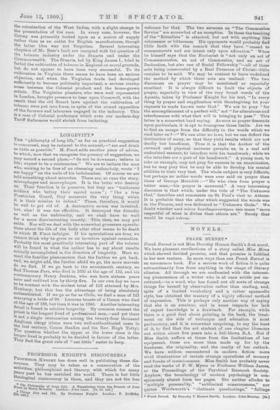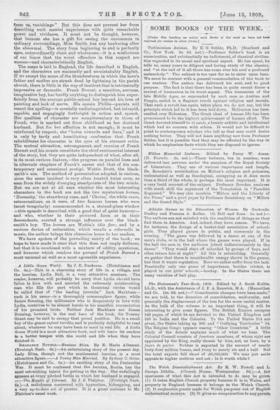NOVELS.
FRANK BURNET.*
Fronk Burnet is not Miss Dorothy Horace Smith's first novel. We have pleasant recollections of a story called Miss Mona which showed decided promise, and that promise is fulfilled. in her new venture. In more ways than one Frank Burnet is an uncommon book. For a serious work of fiction it is quite extraordinarily free front anything in the shape of literary allusion. All through we are confronted with the interest- ing phenomenon of a writer who is at once subtle yet un- cultured,—in a word, who has found out all sorts of strange things for herself by observation rather than reading, and, spite of a limited vocabulary and a rather spasmodic style, has obtained the mastery of a highly efficient method of expression. This is perhaps only another way of saying that she is an amateur, and in some respects her lack of expert knowledge is a drawback. For example, while there is a good deal about painting in the book, the treat- ment on the side of technique and education is most perfunctory, and it is somewhat surprising, to say the least of it, to find that the art student of oue chapter blossoms out within about five years into a full-blown R.A. But if Miss Smith suffers at times from the limitations of her equipment, these are more than made up for by the freshness, the originality, and the sanity of her outlook. We have seldom encountered in modern fiction more vivid illustrations of certain strange operations of memory and freaks of consciousness. Miss Smith has probably never read the works of F. W. Myers or Professor William James, or the Proceedings of the Psychical Research Society. Anyhow, the terminology of modern psychology is con. epic:motley absent from her pages. She neither alludes to "multiple personality," "subliminal consciousness," nor quotes Wordsworth's "obstinate questionings," "fallings
• Frank Burnet. By Dorothy V. Horace Smith. Loudon: John Murray. Visa
from us, vanishings." Bat this 4oes not prevent her from describing such mental experiences with quite remarkable power and vividness. It must not be thought, however, that because she has a gift for seeing the uncommon in ordinary surroundings, Miss Smith has any hankering after the abnormal. The story from beginning to end is perfectly wpm, extraordinarily clean and wholesome—it is a misfortune of our times that the worst offenders in this respect are wpmen—and characteristically English. The scene is laid in England, the life described is English, send the characters are eminently and unmistakably English. If we except the scene of the thunderstorm in which the hero's father and mother are strut* dead by lightning in the parish church, there is little in the way of incident that is intrinsically impressive or dramatic. Frank Burnet, a sensitive, nervous, imaginative boy, has hardly anything to distinguish him super- ficially from the average public-school boy beyond his love of painting and lack of nerve. His cousin Phillis—purists will resent the spelling—is mentally undistiiigeished, but intrepid, capable, and engagingly forthright in action and speech. Her qualities of character are complementary to those of Frank, who ie marked out from childhood as her destined husband. But for her affection is not enough; it must be reinforced by respect; she "hates cowards and liars," and it is only by tardy and humiliating confession that Frank rehabilitates his character in the eyes of his sternest critic. The mutual attraction, estrangement, and reunion of Frank Burnet and.,his cousin constitute the chief sentimental interest nf the story, but they are quite independent of what, after all, is its most curious feature,—the progress on parallel lines and in alternate chapters of Frank's career and that of his con- temporary and occasional protego, Wattio Brett, the black- smith's son. The method of presentation adopted is curious, since the same incident is very often treated twice over, as Neen from the widely diverging standpoints of the two minds. But we are not at all sure whether the most interesting characters in the book are not the two mysterious horses, 'Necessity,' the strawberry roan, and Choice,' the white mare, reincarnations, as it were, of two famous horses who were (mostirregularly) commemorated in a stained-glass window '-this episode is described with a good deal of quiet humour— and who, whether in their pictured form or in their descendants, exerted a strange influence over the black- smith's boy. The horses are Wattle's icloe fire; and by a curious device of reiteration, which 'recalls a ritornello in music, the author brings this obsession home to her readers. We have spoken of the prevailing sanity of the book; we hope to have made it clear that this does not imply dullness, but that it is combined with a mixture of oddity, mysticism, and humour which renders the perusal of Frank Burnet a most unusual as well as a most agreeable experience.











































 Previous page
Previous page